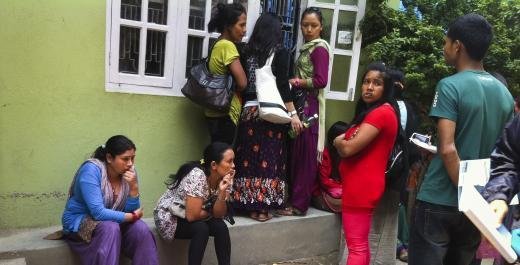KATHMANDU, Nepal (GPI)-- Bahadur Harijan, 50, decided to work abroad in Qatar, a Persian Gulf country, after it became too difficult to financially support his family of four. He did not own any land for growing crops in Chitwan, a district in central Nepal, and did not earn enough farming other people’s paddy and corn, he says. “I wanted to work in Qatar as a construction laborer, and I had my passport with all necessary papers ready,” he says. “But the local recruiting agency told me that I couldn’t work because of my age and returned my papers.” But the family needed money somehow, he says. So instead, his 30-year-old wife decided to work abroad in 2011 as a child caretaker. “Faced with such dire problems, a friend of my wife told us that she could get a good salary working as a child care worker in Kuala Lumpur, Malaysia,” Harijan says. “That is why I sent my wife there, along with her friend.” She went abroad on a three-year contract, he says. “If I had a choice, I wouldn’t have sent my wife that far for work,” he says. “I was forced to do so for the family.” At first, Harijan was nervous about sending his wife abroad for work because he had heard about cases of abuse, he says. “I have heard that some female migrant workers have been tortured, some have been sexually exploited and some forced to work long hours,” he says. “To hear all such information through the women returnees and through the local television channels, my heart aches with sad feelings of apprehension.” But his wife’s employers treat her well, he says. “I get relief when my wife says that she has a pretty decent job, which is not so tough,” Harijan says. Although the family had to mortgage their house and borrow 45,000 rupees ($500) for her employment documentation and airfare, they earn much more now, he says. “My wife now sends 28,000 rupees [$300] per month as savings out of her salary,” he says. “She has already sent home over 500,000 rupees [$5,530]. And out of that money, we have also bought a small piece of land in the village.” They have big plans for a future business and for their 13-year-old twins’ education, who are in the sixth grade at a nearby government school, Harijan says. “When she returns, we will start a small restaurant at a suitable location nearby, as she wished so, and also send our children to a very good school in Kathmandu with a view to make them very successful persons someday,” he says. But when she returns, the family will also have to re-evaluate gender roles. Because Harijan is unemployed and his wife is working abroad, he does most of the household chores his wife would normally do, he says. But it is uncommon for men locally to perform domestic duties, so he faces scrutiny from the community. He says he feels bad when his neighbors talk behind his back. But he depends on his wife’s earnings to support their family.
Advertisement















